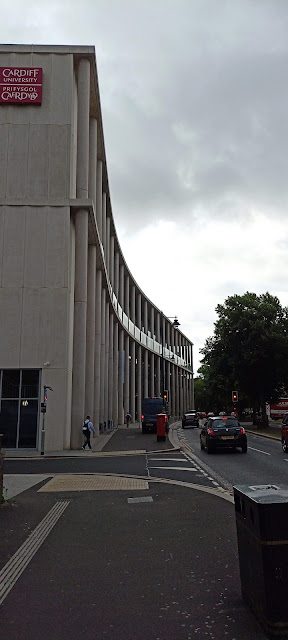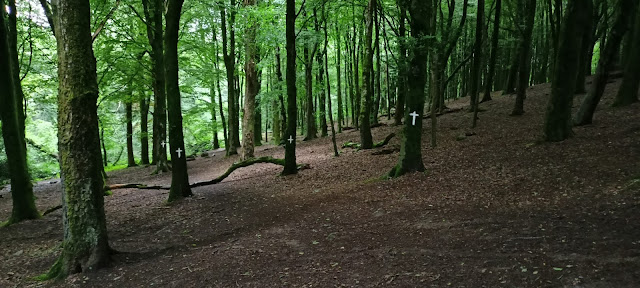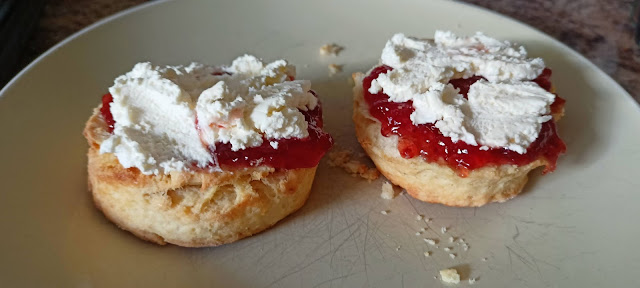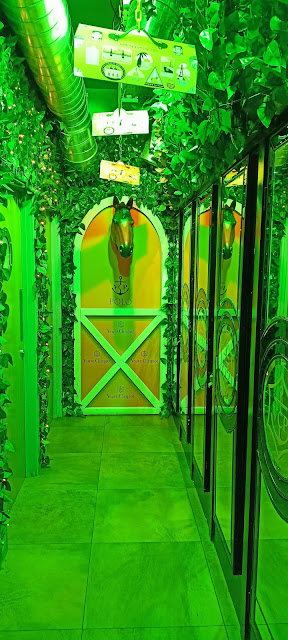Home is for holidays, but every once in a while it's possible to go for research as well. I don't often go to the UK's National Astronomy Meetings (the last one I attended was in Hertfordshire in 2009 !), but this year it was in Cardiff so I basically had to go. It'd be silly not to.
This time it wasn't practical to take the dogs so it was just me, by plane, but going to Cardiff airport instead of pesky Bristol or London. Even though this involves a 2 hour layover in Amsterdam (an airport which is nice but far, far too large), not having to commute on landing is somehow about ten thousand times more convenient. If only there was a budget airline flying this route ! Oh well, one day.
Getting home before midnight meant I didn't feel absolutely shattered the next day, which was technically the first day of the conference. I began with a nice dog walk followed by a visit to a friends, and then in the evening the welcome reception was in Cardiff Bay.
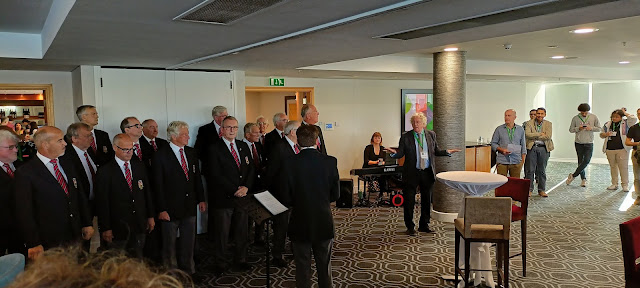 |
| With an actual male voice choir, which is about as Welsh as Welsh can be. |
I learned later that afterwards some people jumped on the conference drinking bandwagon very early, ending up in an axe-throwing bar (those are thing now, apparently) somewhere late that very evening. As it turned out, I think I'm glad I missed that one.
Monday began the conference proper in the shiny new "Centre for Student Life", I guess because calling it the "Student's Union" is too socialist or something. While I quite like the exterior, which is modern but in keeping with the very much older, grander building across the road, I've always wondered why it's so damn big. As it turns out this is very simple : because it's not just a student drinking bar but a whole series of lecture theatres. The largest one, which hosted the biggest sessions, holds 550 people.
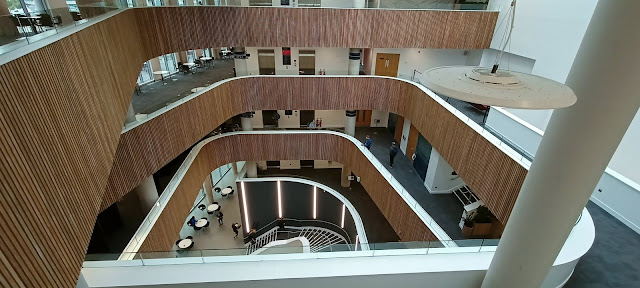 |
| The only thing I don't like is the weird layout of the stairs, which don't form a continuous sequence - you have to walk between stairwells on most floors. |
The Science Bit
The Conference
Rather than do a day-by-day account of how things went, it's probably better if I just pick out the highlights and other notable points. Overall, this was a frankly ludicrously well-organised conference (and I'm not just trying to sing Cardiff's praises, after all we've got professional choirs to do that). Talks were almost always within 5 minutes of their scheduled time, hardly any problems occurred with the projectors and the like, and there were no major clashes between sessions.
Where it really stood out, though, was with the catering, which was the best conference catering I've ever had. Coffee and tea were permanently available (unlike in JanFest, where for some godforsaken reason the bastards kept taking everything away during the talks), with a flow system that was second to none, and during the official morning and afternoon sessions were stocked with biscuits, Welsh cakes, slices of Victoria sponge and lemon drizzle cake which were constantly refilled. Lunch was an all-you-can-eat buffet and, surprisingly, the quality of all of this was actually not half bad - I would even dare to say it was outright good, and think some of my more judgemental colleagues must have been a little... spoiled. Given the standard of the local physics department canteen this was an unexpected but welcome change of pace.
If I have a criticism of the conference itself it's that the invited talks probably should have been called "review talks". This sounds minor, and it is. But "invited" suggests to me the speaker is very prestigious and has some exciting new results to present, whereas a review talk is just a summary of everyone else' research : absolutely fine, but a bit weird if you're sat there waiting for something else.
Solid science
On to the science itself. One thing I was surprised at is that the talks about the epoch of reionisation, when the first stars and other bright sources first lit up and ionised all the gas throughout the entire universe, have changed very little in the intervening 14 years (!)* from when I was last at NAM. But I think perhaps in that respect I've timed this badly : JWST has only just come online, and we may need only another year or two to get some really interesting results here. It looks like those first, stupendously powerful stars are indeed beginning to be found, but we don't have enough information to say anything interesting about them yet.
* Multiple people guessed my age this week, with estimates ranging from 26 to "33, at most". I'm feeling pretty good about that.
On a related front, the recent storm of controversies about whether JWST has found more massive galaxies too soon after the Big Bang appears to be more-or-less over : it hasn't. There was exactly one talk saying we should keep an open mind about whether any of the new results pose fundamental difficulties for the Standard Model but all the rest were pretty clear that this isn't tenable.
To be fair, it does seem that JWST has found an unexpected number of early disc galaxies, as well as galaxies which have already finished forming stars in the early Universe. But these are rather problems of detail, as several speakers explained at some length on just how many uncertainties still remain in the models - there's more than enough scope in the error bars to solve this without throwing out the basic models at all.
Problems with the mass, which would have been much more fundamental and interesting, have been resolved with spectroscopic confirmation of the true redshift (effectively, distance). As we all suspected, the photometric redshifts (and I confess I didn't quite realise how sophisticated this technique can be) just aren't good enough, even when multiple fitting models give the same answer. Spectroscopy has definitively but disappointingly shown that the suspected very early, massive galaxies are actually a lot smaller and closer. They're still interesting, but they're not "oh shit I just wet my pants" level of interesting any more. Oh well*.
* As per another talk, however, the "tensions" between the different Hubble constant values obtained by different methods might yet prove to be something more interesting. I hope so, but I'd bet against it.
For the rest, I'll briefly summarise some of my personal favourites :
- Amélie Saintonge gave a great review talk about star formation in molecular clouds. This interests me in how it relates to star formation on larger scales : can we relate global conditions to local activity ? It seems that we can at least in part. Self gravity seems to be important only in high-pressure environments, and only the densest part of each cloud actually forms stars - there may not be a simple global threshold at which star formation happens.
- Timothy Davis also looked at molecular gas but this time in galaxies experiencing gas loss. Oddly, galaxies in the Fornax cluster have less molecular gas than expected, while those in the more massive, more gas-lossy Virgo cluster have more normal molecular contents ! There seems to be a consensus rapidly emerging that as the thinner atomic gas is lost, initially part of it can be compressed and form molecules. So during the active stripping phase, galaxies have a bit less atomic gas than normal, but can even have more molecular gas than they usually do.
- An honourable mention to Elizabeth Watkins for making a catalogue of gas bubbles and doing it correctly : by eye, without any boring algorithms. I'm a big fan of this approach and I think it would do everyone the world of good to acknowledge that we can't be purely objective all the time.
- Ben Thompson showed that ram pressure stripping, which we normally associate with galaxies moving at the highest speeds in the densest parts of galaxy clusters, can also happen the the edges of galaxies voids. Here the densities and speeds are very much lower so this is not what one would naively expect. It seems that while ram pressure here is never going to be as damaging as it is in clusters, it might still be enough to strip the outer reservoirs of gas, slowly quenching star formation rather than bringing it to a sudden halt.
- Ethan Taylor (no relation) gave a cool talk on the overlap between dwarf galaxies and globular clusters. This series of simulations is to try and find tests to probe the nature of dark matter : globular clusters and dwarf galaxies can have similar stellar masses, but the former don't have any dark matter whereas the latter have lots. His simulations look for objects in between the two. I asked if this could relate to Ultra Diffuse Galaxies (which are awash with such controversies) but alas it seems not, as those are much more extended objects.
- A dis(?)honourable mention to Mac McMullon who had all the best quotes, including, "Dwarf galaxies, woooo !", "I had more fun fonts but Micosoft ate them", and of course, "I've got a badass hangover." Back atcha, Mac, but just wait until you give your presentation in the afternoon and can still complain about your hangover - then we'll talk.
- Finally, David O'Ryan for introducing a code I want to try which seems to be a very sophisticated way of finding the initial conditions of interacting galaxies. It's not yet public but I can imagine this being a godsend for understanding crazy systems like Leo.
- Oh, wait... me ! I gave a crazy-fast distillation of 17 years of research in 10 minutes, summarising the major candidate dark galaxies we've found and how plausible they are. Everyone laughed at the right points, so I guess I wasn't going too much at breakneck speed. Though, while I do like to play the hahah-all-you-chumps-are-interested-in-star-formation angle (whereas I'm looking at gas clouds that don't do anything), I do think there's a serious point people are overlooking here : what keeps some objects dark while others which are apparently otherwise very similar are optically bright ?
Metascience
There was also some great stuff here about not science itself but the process of how we do science : diversity, outreach, and the overlap between science and the arts. There was also a modicum of some truly awful stuff. Now I'm probably going to annoy absolutely everyone when I say the conference was very, very woke, because I mean this in two senses : it had an aspect which is unconditionally, unequivocally and unarguably a Good Thing (everyone of any race, creed, cast, colour, faith or sexual orientation should be able to become a scientist; if you don't believe this, you need to rethink your life choices), but also in the more colloquial pejorative sense. That is, a sort of militant, beatings-will-continue-until-morale-improves approach, you WILL pro-actively embrace all forms of diversity and tolerance or else you'll be taken outside and shot.
Two particular comments stand out regarding the latter. First, a throwaway comment on one of the talks about how science is "colonialising", which I think is utter rubbish. Academia ? Maybe. But science itself ? Simply nope, this is a hideously weird thing to say. Secondly, a suggestion that if countries which unfairly discriminate against LBGTQ/etc., we should boycott those countries. The problem here is that I vehemently despise the current UK "government"'s policies and rhetoric regarding refugees, asylum seekers and the poor. Should I therefore have boycotted NAM ? I don't think so. If I did that, I'd probably have to boycott every country.
I retain the anonymity also of one additional speaker who presented a piece of outreach which has been very successful but, on seeing it, I have to say I personally hated it. I don't hate the goal of inclusivity, obviously. No, I hate the "let's ram this down everyone's throat* and forget to tell them any actual science" approach. Yes, damnit, include as many characters of different ethnicities, ages and backgrounds as you want : the more the merrier. But treat those characters with genuine respect. Show them enjoying research, yes, but show them having difficulties too, just like everyone else. "Happy People Doing Science", encountering no kind of difficulties whatsoever - not so much as an angry bee - is something that is monumentally boring and unbelievably cringe-worthy.
* In other words, "We need MOOAR EXPOSITION about racism ! MOOOOAR !". Come on, this is not an information deficit problem any more. I thought a much better approach was described in another talk : educating teachers and students together, en masse and repeatedly : that's how you beat implicit bias, not by constantly telling everyone "racism is bad" because everyone already knows this. As in Damon Centola's Change, implicit bias happens because of culture, not conscious choices where anyone sits down and thinks, "hmm, how can I fuck the libtards today ?". The only way to tackle this is to change entire groups, not by educating individuals.
A much better message was in a talk of Peter Coles. He gave two outstanding quotes. First, "If you're upset about pronouns, wait till you find out about adjectives", and secondly, "do the best you can to make your work environment the best it can be for people who are not like you." So far as lifestyle choices go, I thoroughly agree (I found it interesting from another speaker that in other countries it's common to end a science talk with a Bible quote, which might not go down well elsewhere !), though I might have some qualms about Flat Earthers. As usual, the question, "where do you draw the line ?" is a legitimate one which can and should actually be answered, and is not merely rhetorical.
But I'm not in a mood for an extended rant about this, so I'll move on to what was for me the stand-out talk of the whole conference : a presentation about Gavin Starks and Andy Newsam's soniverse. This gloriously insane idea began with the simple enough process of sonifying data cubes, turning radio spectra into audio. This seems to work better than I would expect it to; I'd love to incorporate this into FRELLED somehow... but they've gone much further. They're developing a theory of the universe (just purely for shits and giggles I think) in which photons are replaced with sound, so that dark matter becomes silent matter, a batshit crazy resurrection of the aether.
Utterly bonkers. I absolutely love it.
The Social Bit
The non-conferency bits attached to the conference were numerous. We began with an opening address by First Minister Mark Drakeford. Remarkably... he was genuinely funny. Now I quite like the guy but I do normally think of him as the world's most boring hamster. No more. The previous speaker was the vice chancellor, who expressed some skepticism about claims of Roman astronomy in Wales. Drakeford said he wouldn't normally presume to correct him, but went on to list numerous examples, which he described in some detail, of pre-Roman astronomical alignments in ancient Welsh megaliths. It was a well-researched, highly sympathetic speech that in terms of the old golden rule "know your audience" had it utterly nailed. And he was indeed funny, noting, "from the financial crisis to the austerity crisis, the Brexit crisis to the COVID crisis and the cost of living crisis, we move, seamlessly, from one damn thing to another"; and "politics is more akin to astrology than astronomy." Which was delivered with impeccable comic timing that perfectly matched his delivery. It was hardly stand-up, but it bordered on Yes Minister territory.
 |
| The line on the whiteboard is from one of the few presentations where things went awry and the speaker was forced to draw a missing graph. |
Monday evening featured the usual NAM 5-a-side, but I was infinitely more impressed by Mike Edmund's one man Tuesday play, "Sir Isaac Remembers". Mike is now President of the Royal Astronomical Society no less, but a long time back he was my undergraduate academic tutor. Had the X-rays been available on time, my Masters project would have been studying the Antikythera mechanism rather than running galaxy simulations. Oh, the road not taken... Anyway, the play is Mike in character as Sir Isaac narrating a random assortment of his letters and writings, which is both hilarious and educational (genuine edutainment !). It has to be experienced, not described, so I won't try.
Wednesday was the conference dinner at the Millennium Stadium*. Excellent food, plentiful wine, and for £40 it wasn't cheap but I would honestly say it was good value. The one downside was the endless bloody awards, which meant that it was hard to have a conversation with anyone because if nothing else everyone had to stop every two minutes to give a round of applause to someone they'd never heard of winning an award they'd never heard of for research they weren't interested in. However, then we all went out and got very, very drunk, so that was alright in the end.
* Why no, I won't call it the Principality Stadium, you twerps.
Thursday evening had nothing much scheduled, but a surprising number of people went out again and everyone was complaining the next day except me because I went home and had a lovely night's sleep. Mwhahah, bitches.
The Holiday Bit
This was wise, because the conference ended midway through Friday afternoon, whereupon I proceeded down to the bay for the annual Food Festival, and afterwards proceeded to get very drunk again.
The rest of the week was divided between walking the dog...
... buying and reading books and enjoying other local delicacies (the first set are not mine, I just think the juxtaposition in the bookshop is... interesting) :
... continuing to drink until silly o'clock and also exploring Penarth :
And then finally it was time to come home.
About the flights there isn't much to say. Everything went as smoothly as possible, we even took off and arrived either slightly early or dead on time for all flights. I should also mention that Cardiff airport is only marginally larger than I remember it (I went through it back in 2008 for a flight to NAM which that year was in Belfast). It was practically deserted, with only four flights on the whole board, but it could probably comfortably accommodate and feed ten times as many people as were actually present.
Anyway, it was a lovely couple of weeks. As well as catching up with all the most important people, I also ran into people I haven't seen in a good ten years. Whether that's enough to persuade me to go to next year's NAM in Hull, however, is another matter.



